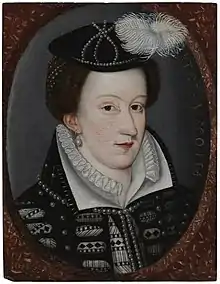Ralph Lygon
Ralph Liggons or Lygon (1540-1619) was an English Catholic involved in conspiracies and a supporter of Mary, Queen of Scots.[1]
Family background
He was a member of the Worcestershire Lygon family, a son of William Lygon (died 1567) and his wife Eleanor Denys. His brother Richard (died 1584) was head of the family, based at Madresfield Court, his brother Roger Lygon was a Gentleman Usher to Mary I,[2] and his nephew William Lygon was a Member of Parliament.[3] Several contemporary records include his surname written as "Liggons" or "Ligons". These spelling are preferred by historians.
Career

Ralph Liggons attended the baptism of James VI at Stirling Castle in December 1566. Mary, Queen of Scots gave him a gold chain.[4] He was involved in the Rising of the North in 1569, and plotted with Thomas Howard, 4th Duke of Norfolk and Mary, Queen of Scots. He received a pension from Philip II of Spain. Mary's secretary Claude Nau sent him a cipher code to use in correspondence in January 1577.[5]
He was an exile in Brussels and Paris after the revealing of the Ridolfi Plot.[6] Mary, Queen of Scots also left him a pension in her will.[7]
Liggons was involved in the 1605 Gunpowder Plot.
References
- Katy Gibbons, English Catholic Exiles in Late Sixteenth-century Paris (Boydell, 2011), p. 155.
- David Loades, Mary Tudor (Basil Blackwell, 1989), p. 191.
- William Lygon Beauchamp, Madresfield Muniments (1929), p. 25.
- Thomas Thomson, James Melville: Memoirs of his own life (Edinburgh, 1827), p. 172 as "Lignish": Tracey Sowerby, 'A Memorial and a Pledge of Faith': Portraiture and Early Modern Diplomatic Culture', English Historical Review, 129:537 (April 2014), p. 317.
- William Barclay Turnbull, Letters of Mary Stuart (London, 1845), p. 251.
- Katy Gibbons, English Catholic Exiles in Late Sixteenth-century Paris (Boydell, 2011), p. 29.
- Teulet, vol. 5, p. 503.